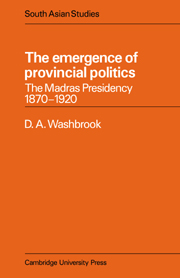Book contents
- Frontmatter
- Contents
- Preface
- Abbreviations, notes on references and spelling
- Introduction
- 1 The Madras Presidency
- 2 The governance of Madras
- 3 The political economy of Madras
- 4 Local structures of political power
- 5 The emergence of provincial politics
- 6 The vocabulary of communal politics
- 7 The Home Rule League, Justice Party and Congress
- Conclusion
- Glossary
- Bibliography
- Index
2 - The governance of Madras
Published online by Cambridge University Press: 21 September 2009
- Frontmatter
- Contents
- Preface
- Abbreviations, notes on references and spelling
- Introduction
- 1 The Madras Presidency
- 2 The governance of Madras
- 3 The political economy of Madras
- 4 Local structures of political power
- 5 The emergence of provincial politics
- 6 The vocabulary of communal politics
- 7 The Home Rule League, Justice Party and Congress
- Conclusion
- Glossary
- Bibliography
- Index
Summary
‘Government’ was omnipresent in the life of colonial South India. Whether we examine the newspapers, the letters, the autobiographies, the pamphlets or the books of the period, repeatedly we find references to the power, promise or peculiarities of the entity known as government. The avaricious begged its favour, the ambitious its confidence, the pious its protection and the nationalistic its self–destruction. By the standards of contemporary Europe, Madras society was obsessed by the notion of government. If, however, we try to define what precisely was meant by the term ‘government’ and of what social material it was made we encounter an improbably complex series of problems. Government in Madras was both a great deal more and a great deal less than the hundred or so Europeans who composed its senior civil service. Involved in it, in one way or another, were the British Parliament, sitting six thousand miles away and concerned with the affairs of an international empire; barely literate peasants, on salaries of four shillings a month and concerned with the taxation of a few barren acres; and the broad spectrum of people and interests which lay between them. Men whose outlooks were bounded by the village, the town, the district, the province, the nation and the empire all were locked together in the chain of government in Madras. Depending on the position from which it is viewed, therefore, ‘government’ can be seen to form many different patterns and to be composed of many different substances in different places.
- Type
- Chapter
- Information
- The Emergence of Provincial PoliticsThe Madras Presidency 1870–1920, pp. 23 - 63Publisher: Cambridge University PressPrint publication year: 1976

